Almost There: Faye Dunaway in "Barfly"
 Tuesday, November 10, 2020 at 9:14PM
Tuesday, November 10, 2020 at 9:14PM 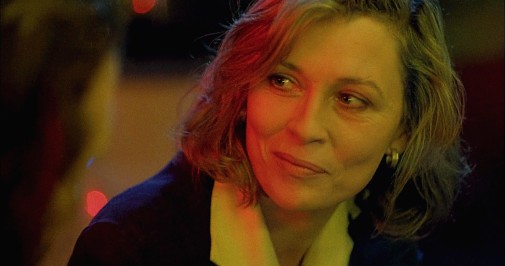
I confess myself surprised by the reader's choice in this last round of voting for the Almost There series. When it came time for you to select what 1987 performance should be explored this week, your votes decidedly indicate a preference for Faye Dunaway's post-Mommie Dearest Oscar bid, Barfly. This under-discussed Barbet Schroeder flick was made from a semiautobiographical script by the bonafide poet of the gutter, Charles Bukowski. It competed in Cannes but it didn't cause much fanfare, mainly valued as an acting showcase for its cast, led by Mickey Rourke as a tic-ridden sing-songy facsimile of Bukowski himself.
As for Faye Dunaway, she takes around 22 minutes to enter this picture about alcoholism and the addicts who scuttle from the light like bugs. Haggard-looking and sitting lonesome at the end of a bar, she's quite distant from the image of a glamourous diva many might associate with the actress' screen persona…
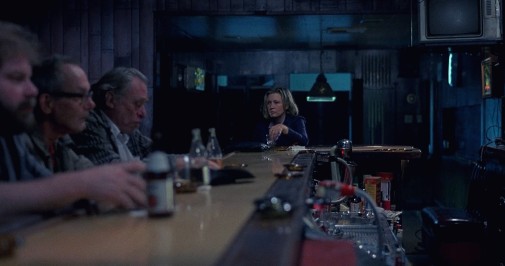
Rourke's Henry Chinaski has just been kicked out of his usual haunt after another fight with the bartender. Though victorious, he's thoroughly beaten and in need of some boozy refreshment. Thirst and despair drag his destitute self to another establishment and there he finds Wanda. Up until then, Barfly's been dominated by piss-yellow luminescence and shadows in shades of viridian vomit, but Robby Müller lights the woman in cold azure-ish grey. She looks like a grimy ghost or perhaps a cadaver holding itself upright by some ungodly force.
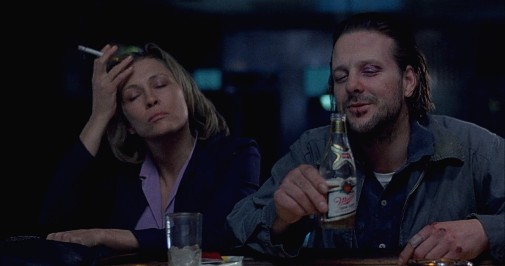
Immediately, Dunaway's a harbinger of formal variation, a ball of negative energy that reflects and complements Rourke's drunken poet. When Henry gets closer, the first words out of her mouth are a proclamation of dislike for everyone else in the world. "I can't stand people. I hate them." – a line Dunaway utters with world-weary exhaustion before going off on a somnambulistic appreciation of Rourke's battered visage. Wanda thinks his beat-up face looks beautiful and she's not even kidding. Someone who lives at the bottom of the barrel learns to find beauty in the sludgy darkness they call home.
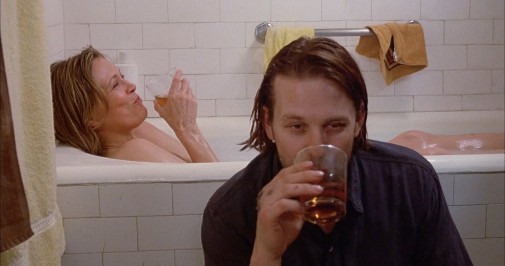
Bukowski's unique sense of humor is well handled by Dunaway whose commitment to the film's challenges both impresses and beguiles. She does very little in this first scene, corpse-like as she is, but we can't help but be drawn to her faded magnetism. Maybe it's some ineffable aura the diva possesses, or maybe it's the stark contrast between Dunaway and Rourke. The latter often looks like there's an entirely different drama going on inside his head, something he's unable to fully articulate for the camera and the audience. This is both fascinating and frustrating, more rewarding for the performer than for the audience. Dunaway couldn't be more different.
If he's an insular presence, she's a sprawling ocean whose transparent waves dazzle and frighten before they crash above us and drown with smothering sorrow. Hers is an immersive, faintly cerebral, performance that invites the spectator to come closer, to come inside her character's head. Furthermore, there's always a sense that Wanda isn't fully living in the moment, part of her stuck in perpetual reminiscence of what she once was. Dunaway makes this clear, giving enough behavioral minutia for us to understand who this woman might have been outside the cloud of addiction.
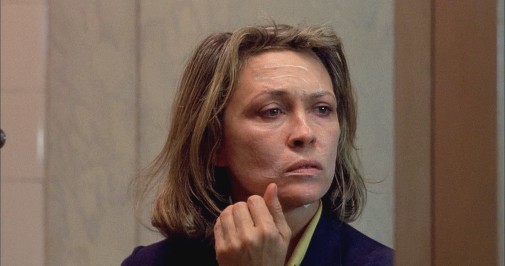
Dunaway lets us feel Wanda's history even if the script rarely alludes to it, playing the role of someone at the end of a long sad tale that's happened offscreen. You see it in the slivers of bruised vanity, her unexpected glee, the way she savors some occasional witty line. This is further emphasized by Dunaway's particularities as a performer. The Oscar-winning star of Bonnie and Clyde has never been an effortless actress, one that hides their craft through veils of fake casualness. Instead, she makes sure we're aware of her acting, every deliberate tension of the face preluded by a suspenseful breath or the turn of the head towards the light.
This can be tiresome, but it can also be sublime. It all depends on the role and the film. Barfly's a rambling tale, a half-remembered nightmare, perhaps the incoherent ramblings of the drunkard who blesses a bar's patrons with garbled storytelling. It's a cynical game of observation, drawing wry conclusions from a theatre of the intoxicated. Regarding Wanda, she's rather sublime in her pitiful way, a woman whose soul has been fermenting in cheap liquor for the past decade or so. The specificities of movie and character thus make for a great canvas unto which Dunaway's exacting showmanship can flourish and paint an impressive picture.
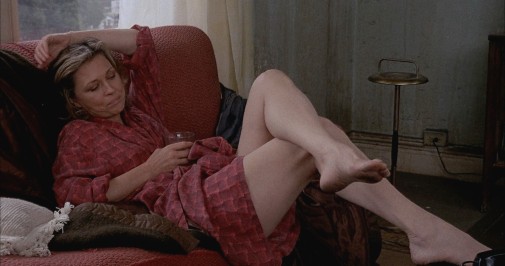
Whenever the actress' choices feel a bit too deliberate, it reads as if Wanda is rehearsing what to say, tirelessly trying to maneuver the nebula of drunkenness to sick out semi-intelligible words. Her internal machinations come off as a woman's desperate struggle to still be herself through the anesthesia of alcohol. Regard, too, the way she rearranges her body in the morning light once she notices Henry noticing her. It's a self-conscious dance, a clumsy reinterpretation of provocative sensuality. Wanda looks and acts like a faded beauty, a once blinding star that's lost its light. The ghost of her shine torments her and it torments us, who watch her, as well.
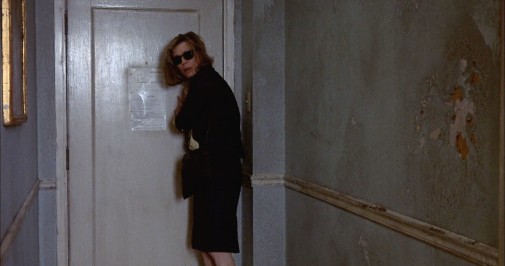
To be honest, this is a performance full of great details that call for verbose analysis. I'm thinking of how she says she doesn't want to fall in love, not again. The line, as written, is a vague whisper, unsubstantial in information but suggestively wistful. Dunaway's the one who adds a prismatic rainbow of color to the words. She shades them with the echoes of old emotions. Later, in the same scene, when she bites down on purloined ears of green corn, it's as if Wanda's feelings are a mountain of old pains crashing down. Nothing ever works for this woman and the inedible maize is that unexpected drop that makes the glass overflow. Misery cascades down her face, her downturned mouth, and empty eyes.
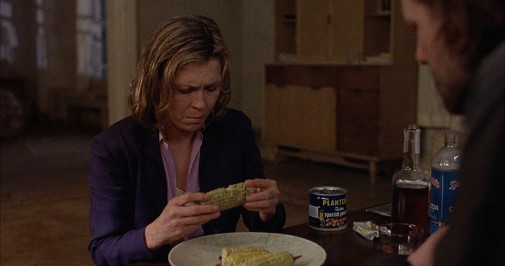
All in all, like many of Dunaway's most controversial works, this star turn is almost frightening in its intensity. Nothing better represents this than the way she manages to barrel through the script's more dubious decisions, killing any hint of maudlin excess with a spike of meanness, and finding truth in the labored dialogue. When Wanda speaks of an Angel of Death coming to take her, for example, the thespian forces the sudden lyricism to sound genuine, a burst of oneiric derangement onset by a crumbling mind. Near the end, Faye Dunaway even manages to redeem a ridiculous catfight with her sheer ferociousness. It's astounding to behold.
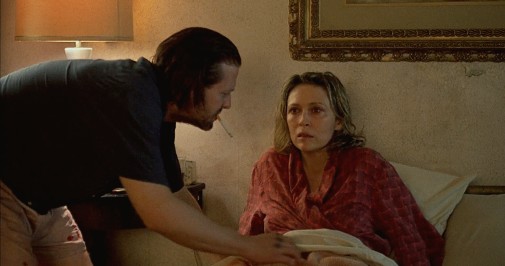
While it's a smidge difficult to imagine AMPAS going for such a puke-stained antidramatic chronicle of alcoholism and grubby humanity, stranger things have happened. Dunaway got as far as getting a Golden Globe nomination for Best Actress but failed to make it into the Academy's nominated quintet. Instead, the honored performers were Glenn Close in Fatal Attraction, Holly Hunter in Broadcast News, Sally Kirkland in Anna, Meryl Streep in Ironweed, and, of course, the victorious Cher in Moonstruck. It's interesting to consider that Streep's nominated character is rather like Dunaway's Wanda, both women cursed by the need for booze and drowning in despondence.
Another thing both performances have in common is their dubious categorization. While Ironweed and Barfly were viewed as two-protagonist stories by awards bodies, their narratives are dominated by Jack Nicholson and Mickey Rourke respectively. Streep and Dunaway have big roles, but they're arguably secondary, always supporting, complementing the men's story and themes. Like many a star, Dunaway would have probably refused a supporting campaign at the time, but it's fun to speculate how that lineup would have looked with her in it.
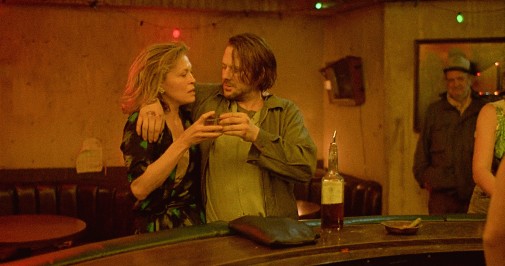
Would you have nominated Dunaway in 1987? If so, under which category would you honor her haunting performance in Barfly?



Reader Comments (12)
Interesting analysis of a fine if difficult to watch piece of work.
I remember there was a big noise when the film came out with many magazine features and TV interviews of Faye giving her career a much needed at the time boost. The film was playing at my theatre, and doing next to no business, so I took advantage and stayed after work one night to check it out since I could do that for free.
I overpaid. Misery piled upon misery upon misery isn't entertainment, at least for me. But though I loathed the film I did admire Faye's work and commitment to the role. But the film bombed hard and with no nomination Faye's prospects faded with them.
Will there be a look at runner up Lillian Gish's work in Whales of August? Hope so she was my pick, if so hope it's as incisive as this!
Yeah as joel6 wrote, while this movie wasn't a major smash or anything it is a fascinating cross section of two stars at very different stages of their career. Rourke was ascendant and she was really seen as making something of an enormous comeback and was obviously of a different generation of movie star and actor. It's a weirdly specific and niche kind of pop cultural film. And while I'm not really sure theoretically how close she actually came to a nomination, she did get that golden globe nomination and lots of critical praise.
I have to admit that while I love Dunaway, and do think she does make a formidable impression, I actually probably would have nominated those five over her (I have never seen Wish You Were Here and as of now the five women nominated might have been my own personal line-up). Again I like her a lot but it's oddly never been one that pops to mind when I think of her.
It's a good film , with a talented director behind cameras, and two magnificent actors: Rourke is almost as good as he's in The wrestler, and Dunaway gives it all in every scene, her eyes show how lost is her soul , for me is way better than Kirkland.
To me this movie is a classic Faye performance. She is so memorable in it, along with Mickey Rourke. Faye will always (I hope) be considered with Fonda, Streep, etc. as one of the great film actors. Her output is maybe more uneven, but she is iconic.
Faye Dunaway may not have been nominated for an Academy Award for her work in Barfly but she was indirectly responsible for Jeremy Irons winning his Oscar for Reversal of Fortune: when Barbet Schroeder was casting Klaus Von Bulow in Reversal of Fortune he had Klaus Maria Brandauer in mind, he asked Faye Dunaway, who acted with him in Burning Secret, and she dissuaded him claiming that Brandauer was difficult. Irons got the role when Glenn Close, who had worked with him on The Real Thing on Broadway, suggested that he would be a suitable Klaus Von Bulow.
I was hoping for a Gish review but this is a surprise,I feel she is borderline but it's the last great performance she gave.This series is a real tonic Mr Alves.Thankyou.
The original LEAVING LAS VEGAS!!!
I agree that Dunaway and Streep's characters are secondary in their films to their male co-stars in terms of how narrative works out. The same can be said about Jennifer Lawrence who has like one scene near the end without Bradley Cooper in her Oscar-winning film "Silver Linings Playbook".
It's interesting that "Ironweed" is the only Streep's performance to get Oscar nod without previous Golden Globe nomination. Dunaway was nominated there and I feel like Oscar voters saw that line-up and swapped both of them due to "Ironweed" earning Oscar nods in other main categories and "Barfly" not going anywhere. Also I guess Streep was already highly regarded and well-liked back then while Dunaway... not so much. I prefer Faye's work here over Meryl's, though. It's certainly the best Dunaway's performance in post-"MD" chapter of her career.
Dunaway was tremendous in this film. I expected it to be the start of a big comeback, but sadly no. Two years later, she starred as Serena Joy (the Yvonne Strahovski role) in Volker Schlöndorff's big screen adaptation of The Handmaid's Tale (with Natasha Richardson in the title role). Has anyone seen it?
joel6 -- Sorry, this month I'm only analyzing the winners from each of those polls. I'm also afraid my thoughts on Gish wouldn't be nearly as positive as my feelings for Dunaway in BARFLY.
Peter -- As much as I love her in this, I'm not sure I'd nominate her above any of the Best Actress nominees. Best Supporting Actress is another story altogether.
Cafg -- I still prefer Kirkland. Also, as much as I admire and love Dunaway's despondent star turn, my pick for the picture's MVP is Robby Müller. His colors give the sense of overwhelming misery an odd, almost refreshing, look.
Tom Ford -- I admire her a lot even if, as you say, she's pretty uneven.
Pat -- I didn't know about that. Thanks for sharing.
markgordonuk -- I wouldn't say it's her last great performance. It's the last time she came even a little bit close to the Oscars, though.
Kenny -- Interesting comparison, though I don't think this picture ever gives as much relevance to Dunaway as LEAVING LAS VEGAS gives to Shue.
TheDrMistery -- It's interesting to think about category placement. Before this re-watch of BARFLY, Dunaway dominated my memory of it and I was shocked by how little she actually is in the movie. There's not a single scene where she appears without Rourke.
Working stiff -- I've seen that adaptation of THE HANDMAID'S TALE and Dunaway is amazing in it. She takes a completely different approach in comparison to Strahovski, underplaying Serena's outward malevolence and fragility. Instead, her relationship with Richardson is closer to a professional sort of chilliness, cruelty delivered with a smile. I would have honestly considered her for a Best Supporting Actress nomination in 1990, and that's an amazing year for the category.
Thank you all for the feedback.
Claudio-Take Dukakis out of the supporting line-up and literally none of those other performances would have qualified for me, it is IMO one of those bizarre years where none of the ladies gives a bad performance but the line-up somehow manages to be so much less than the some of it's parts and ultimately very uninteresting. Dukakis' win just can't really be argued with when set alongside the other four (well Archer's more complicated because she is great but I don't know that she's doing anything another actress could have done. I think it's actually kind of craftily written role, but not exactly difficult per se).
But, as in best actress, I don't really have an obvious alternative line-up. Huston and Kathy Baker would be there, as well as Carmen Maura for Laws of Desire. But Dukakis aside I have trouble thinking of who would be the final slot. It seems like Redgrave but as much as I enjoy her it's not a performance that really sticks in my mind so I'm hoping for a more interesting alternative.
Faye is magnificent here and surely deserved a nom over Meryl...but Sally's my winner no matter the competition.